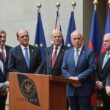German Politics: Minister of Saxony Rejects AfD Ban, Advocates for Alternative Approach
Saxony’s Minister-President, Michael Kretschmer of the Christian Democratic Union (CDU), has categorically rejected the idea of a ban on the far-right Alternative for Germany (AfD) party. In an interview with the Handelsblatt, Kretschmer emphasized that discussing a potential ban would only benefit the AfD, making it stronger in the process. He believes that such a move should be avoided.
Kretschmer also highlighted the lack of success in dealing with the AfD over the past decade, stating that the party has not been effectively countered. He suggested that the CDU should stop enabling the AfD’s “martyr role” and instead focus on a different approach.
The Minister-President emphasized the importance of tackling the pressing issues that concern the population, such as migration and urged politicians to take concrete actions to address these concerns. He cited the example of Alexander Dobrindt, the Federal Minister of the Interior, who has taken a consistent approach to migration policy.
According to Kretschmer, taking away the “nutrient soil” from populists by addressing the people’s concerns would be a more effective way to counter the AfD’s influence. He believes that the AfD’s popularity stems from the fact that the party has been able to capitalize on the population’s concerns, which have not been adequately addressed by other parties.
Article 21 of the German Constitution states that parties that aim to abolish or undermine the free democratic basic order or threaten the existence of the Federal Republic of Germany are unconstitutional. Former Constitutional Court judge, Gabriele Britz, recently emphasized the importance of considering the possibility of a ban under certain circumstances, particularly if the necessary conditions are met and the problems at hand have not been resolved through political means.
Britz, in an interview with the Süddeutsche Zeitung’s podcast “Ist das gerecht?”, warned that the freedom of the government to decide on a ban or not has its limits. She emphasized that the government’s discretion in this matter is not limitless and that, at some point, the need for a ban may arise if the necessary conditions are met and the problems have not been resolved through political means.





